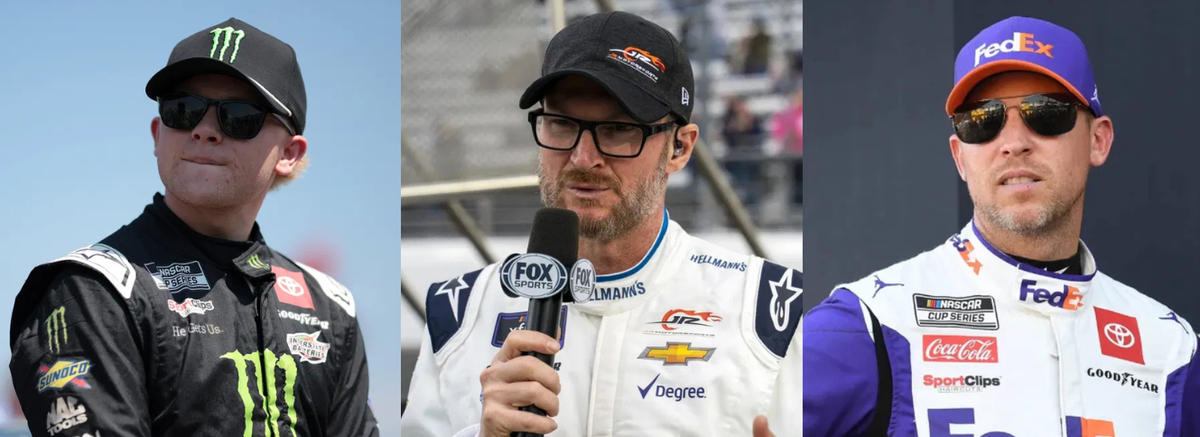Sep 23, 2025 | 11:01 PM EDT




“The common-sense approach to this should have been obvious.” But is it always? Ty Gibbs is one name who often does not care about what the obvious is. There are instances when the racers put the team position over self-glory throughout, such as in the Atlanta race this season, when Hendrick Motorsports’ Alex Bowman not only gave his teammate Chase Elliott a chance to win the race but also helped Elliot pass Brad Keselowski on the last lap, which gave the No. 9 car the victory. Such self-sacrificing actions show the fine line between personal ambition and group ambitions in a game where affiliations are capable of winning championships. However, once that equilibrium breaks, it creates a lot of suspicion throughout the garage.
Watch What’s Trending Now!
The last playoff race at the New Hampshire Motor Speedway reversed the order of things when the Joe Gibbs Racing teammates Denny Hamlin and Ty Gibbs collided on lap 110. Fifth in the standings with five wins in the year, Hamlin drove with playoff intensity in search of his first title, and Gibbs, in need of his maiden Cup win, fought back, shooting ahead like his Sonoma pit-road collision with Brad Keselowski’s crew. This conflict roused the keen attention of the legends of the sport, like the Hall of Famer and two-time Daytona 500 winner Dale Earnhardt Jr., whose incisive insight gets to the nub of the team-building process. His reflection is still new, but there is more going on below the surface.
Dale Jr weighs in on the part played by Gibbs in the tangle
Dale Earnhardt Jr. was not afraid of tearing the New Hampshire event between Denny Hamlin and Ty Gibbs into tiny fragments, laying the blame squarely on the history of Gibbs’ questionable teammate decisions on his dirtymomedia Instagram post. “Was it necessary for Denny to wreck him into the wall? Um, nah, probably not, but damn it gotta look at Ty’s history. He’s not been a great teammate at times,” Earnhardt said. He highlighted the 2022 race at Martinsville, where Gibbs crashed his teammate, Brandon Jones, in the final lap to secure the victory, despite the fact that Jones was fighting to be in the race for the championship, even forcing the team owner Joe Gibbs to comment on internal etiquette.
View this post on Instagram
This, Earnhardt contended, was a trend where Gibbs puts himself above the squad, but this is particularly detrimental when Hamlin is in the playoffs, fighting to earn points. Earnhardt sided with Hamlin and pointed out that non-playoff drivers such as Gibbs were expected to give way to their teammates in pursuit of a title because it was in the best interest of the entire organization, including crew chiefs and engineers. “You’re our teammate like you’ll totally let him go. If I’m racing my teammate and he’s in the playoffs and I’m not, like, I’m not even thinking about him in the car; I’m letting him go.”
With his playing experience and playoff insurance of 27 points above the cutline, Hamlin had to have all possible advantages at NHMS, and a mid-race scuffle over mid-pack position seemed unnecessary. Earnhardt referred to the entire episode as “silly” because Gibbs would not relent, and even though Gibbs had a faster car before, the greater good of Joe Gibbs Racing being championship contenders was overlooked.
This was reiterated by co-host TJ Majeski, who continued to press on the subject of team loyalty: “At the end of the day though, don’t you look at the big picture and be like, ‘Hey, at the end of these are my teammates.'” reinforcing that Gibbs’ mindset clashed with NASCAR norms where playoff contenders get deference.
Afterwards, Gibbs did not give it much thought, informing the media that “it’s unfortunate, but I’m excited to go race next week,” avoiding the rift within the team. This reaction merely fueled worries of his development, and this was further heightened when the Martinsville precedent was reached when he confessed to “selfish actions,” but there was no action taken against him, and in this case, JGR must find a way of dealing with this kind of tension in the Cup Series.
This dust-settling skirmish of a teammate brings up larger issues of loyalty and growth in powerhouse teams. All the same, behind the frustration, the storyline is interesting enough, NASCAR-wise, with its implicit innuendoes.
Unloading the Gibbs-Hamlin rift in depth
It wasn’t a simple bump between Ty Gibbs and Denny Hamlin, but a glimpse into the power games and the unspoken laws of
Joe Gibbs Racing that make fans addicted. This conflict, as one of the analysts has stated, “This clash wasn’t just about one race, it’s about power, respect, and the unspoken rules inside one of NASCAR’s powerhouse teams.”The action occurred on lap 110, with Hamlin pushing to the playoffs and Gibbs defending against him, culminating in a spin that sent Gibbs home early. Insider Jordan Bianchi identified a problem of self-interest in Gibbs, noting,
“There have been instances—and you can go back to the Xfinity Series race a few years ago at Martinsville—where Ty Gibbs has put himself before the team,” he said.This feud underscores the fact that these kinds of situations put JGR through its toughest time; in this case, it’s the experience of Hamlin versus the talent of Gibbs. What is so fascinating about this rift is the question of intent and maturity, which generates garage talk of
“Was Hamlin teaching a necessary lesson, or was Gibbs the victim of a veteran who lost his patience?” That is the argument fans are playing on, which is a debate that is dividing opinions.Bianchi also went into detail, mocking Gibbs for fighting so hard to earn a meaningless position:
“In this instance, I get it. You’re racing hard, but it’s 11th, 12th, or 15th place, whatever it is, and in the grand scheme of things, that one or two spots means nothing to Ty Gibbs.” Having JGR as its leader, such as Joe Gibbs coming in to negotiate, as he has negotiated similar playoff talks with drivers before the playoffs, can change the culture of the team amidst the grind.At its core, this drama exposes growth pains for Gibbs as JGR’s future face, with Bianchi warning,
“To me, this speaks to the greater issues of the driver of the 54 car about maturity, and it’s been a big thing and a big word about him and his growth as a driver.” The feud’s layers, family ties, playoff pressures, and internal hierarchies make it a compelling narrative that could define JGR’s season. As Bianchi urged, “This is something that needs to be addressed and, frankly, should have been addressed a long time ago,” hinting at lingering team fractures that add real stakes to every lap.


